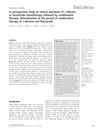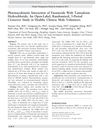 164 citations,
January 2014 in “Journal of Cutaneous and Aesthetic Surgery”
164 citations,
January 2014 in “Journal of Cutaneous and Aesthetic Surgery” PRP injections increase hair density and satisfaction in androgenetic alopecia patients.
[object Object]  7 citations,
October 2015 in “American Journal of Primatology”
7 citations,
October 2015 in “American Journal of Primatology” Monkeys with hair loss during pregnancy showed higher stress hormone levels and invested differently in their offspring.
 3 citations,
February 2022 in “Journal of Infection”
3 citations,
February 2022 in “Journal of Infection” People with no symptoms or mild COVID-19 have lower antibody levels, increasing their risk of getting COVID-19 again.
 3 citations,
July 2018 in “African Journal of Urology”
3 citations,
July 2018 in “African Journal of Urology” Finasteride before TURP reduces blood loss and slightly improves early postoperative quality of life.
 3 citations,
April 2013 in “International Journal of Clinical Practice”
3 citations,
April 2013 in “International Journal of Clinical Practice” Combination therapy for 9+ months maintains symptom improvements after stopping alpha-blockers or finasteride.
 October 2024 in “The Journal of Dermatology”
October 2024 in “The Journal of Dermatology” Intravenous corticosteroid therapy is effective for long-term hair regrowth in alopecia areata, and a scoring system helps predict treatment success and relapse.
 June 2023 in “British Journal of Dermatology”
June 2023 in “British Journal of Dermatology” Baricitinib was effective and safe for severe hair loss treatment over 6 months.
 March 2005 in “International Journal of Cosmetic Science”
March 2005 in “International Journal of Cosmetic Science” A new method helps understand hair shine and various products improve hair care.
January 2020 in “International Journal of Applied Biology and P” Finasteride treatment for three years changes certain polyamine levels in the blood but not in urine.
 20 citations,
April 2012 in “Fertility and Sterility”
20 citations,
April 2012 in “Fertility and Sterility” Finasteride causes lasting fertility decrease in rats.
 7 citations,
February 2015 in “Clinical Therapeutics”
7 citations,
February 2015 in “Clinical Therapeutics” Finasteride and tamsulosin hydrochloride can be safely taken together without significant interaction.
 5 citations,
October 2018 in “Sains Malaysiana”
5 citations,
October 2018 in “Sains Malaysiana” Testosterone reduces key molecules needed for early pregnancy in rats.
 March 2020 in “Hair transplant forum international”
March 2020 in “Hair transplant forum international” The document's conclusion cannot be provided because the content is not available.

Accurate diagnosis of cicatricial alopecias requires thorough scalp examination and multiple biopsy techniques.
17 citations,
January 2004 in “European journal of obstetrics, gynecology, and reproductive biology/European journal of obstetrics & gynecology and reproductive biology” Certain hormone medications can treat symptoms like acne and unwanted hair, regulate periods, and prevent pregnancy in women and teenage girls.
 26 citations,
November 2011 in “Arquivos Brasileiros De Endocrinologia E Metabologia”
26 citations,
November 2011 in “Arquivos Brasileiros De Endocrinologia E Metabologia” Diagnosing PCOS in teenagers should focus on signs of excess male hormones and not rely solely on ovarian ultrasound or irregular periods, and should be reassessed in adulthood.
 3 citations,
June 2023 in “European heart journal open”
3 citations,
June 2023 in “European heart journal open” Women with irregular periods have a higher risk of heart disease.
 2 citations,
May 1999 in “PubMed”
2 citations,
May 1999 in “PubMed” Hyperandrogenism in women can cause acne, hair growth, hair loss, irregular periods, and increase the risk of infertility and diabetes.
 1 citations,
November 2023
1 citations,
November 2023 PCOD mainly affects young women, causing symptoms like irregular periods and weight gain, with mixed success from lifestyle changes and medication.
1 citations,
August 2022 in “Case Reports” A rare ovarian tumor caused high testosterone, hair loss, and missed periods, but surgery fixed these issues and led to pregnancy.
[object Object]  January 2024 in “Deleted Journal”
January 2024 in “Deleted Journal” Most mothers who get postpartum care are healthy during the postpartum period.
 77 citations,
March 2004 in “Human Reproduction”
77 citations,
March 2004 in “Human Reproduction” Women with irregular periods and/or excessive body hair are more likely to have polycystic ovaries, and this condition is linked to higher health risks.
 38 citations,
May 2006 in “Archives of Gynecology and Obstetrics”
38 citations,
May 2006 in “Archives of Gynecology and Obstetrics” Women with only irregular periods or excess hair have a better hormone profile than those with full PCOS, but both groups are similar, indicating a need for better PCOS diagnosis methods.
20 citations,
January 1995 in “Cells tissues organs” Changing light periods synchronized wool growth cycles in sheep.
 March 2023 in “East African scholars journal of medical sciences”
March 2023 in “East African scholars journal of medical sciences” Metformin may help regulate periods and cause modest weight loss in PCOS patients, but more research is needed.
December 2022 in “Journal of Pharmaceutical Negative Results” Late onset of first period and irregular development of sexual traits in teenage girls can lead to poorer reproductive health.
 July 2022 in “International journal of medical science and clinical invention”
July 2022 in “International journal of medical science and clinical invention” Women with irregular periods should be checked for PCOS and treated early to prevent complications, with birth control pills helping to manage symptoms.
 66 citations,
August 1999 in “The Journal of Clinical Endocrinology & Metabolism”
66 citations,
August 1999 in “The Journal of Clinical Endocrinology & Metabolism” Women with acromegaly often have irregular periods due to hormone imbalances and growth hormone effects.
11 citations,
December 2017 in “Journal of the American Academy of Dermatology” The levonorgestrel intrauterine device for heavy periods may cause acne, hair loss, and excess hair growth.
 9 citations,
January 2022 in “Reproductive Biology and Endocrinology”
9 citations,
January 2022 in “Reproductive Biology and Endocrinology” High levels of male hormones and irregular periods best predict how well PCOS patients will respond to metformin treatment.
























